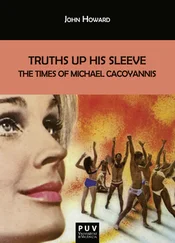He climbed the last rise, his heart beating faster. As he reached the crest the house came into' sight below, first the roof and the broken gable, then the whitewashed walls, everything as it had been before. Surely, he thought, surely now I have outlasted the last of the Visagies; surely every day I spent living on air in the mountains or being devoured by time in the camp was as long a day for that boy to endure, eating or starving, sleeping or waking in his hiding-hole.
The back door was unlocked. As K pushed open the top flap something leapt out nearly into his face and raced away around a corner: a cat, a huge cat with mottled black and ginger fur. He had never seen a cat on the farm before.
The house smelled of heat and dust, but also of old fat and uncured leather. The smell grew worse as he approached the kitchen. At the kitchen door he hesitated. There is still time, he thought, time to brush away my footprints and tiptoe out. Because whatever I have returned for, it is not to live as the Visagies lived, sleep where they slept, sit on their step looking out over their land. If this house were to be abandoned as a home for the ghosts of all the generations of the Visagies, it would not matter to me. It is not for the house that I have come.
The kitchen, into which a beam of sunlight shone from the hole in the roof, was empty; the smell came from the pantry, where, peering into shadow, K made out a side of sheep or goat hanging from a hook. Though there was little left of the carcase but bones held together by a dry grey parchment, green-bellied flies still buzzed about it.
He left the kitchen and went through the rest of the house seeking in the-gloom for signs of the Visagie boy or clues to his hiding-place. He found nothing. The floors were covered in a fresh film of dust. The attic door was padlocked on the outside. Furniture stood where it had always stood, there were no telltale marks. He stood in the middle of the dining-room and held his breath, listening for the faintest stirring from above or below; but the very heart of the grandson, if there were a grandson and he were alive, beat in time with his own.
He emerged into sunlight and took the track across the veld to the dam and the field where once he had scattered his mother's ashes. Every stone, every bush along the way he recognized. He felt at home at the dam as he had never felt in the house. He lay down and rested with the black coat rolled under his head, watching the sky wheel above. I want to live here, he thought: I want to live here forever, where my mother and my grandmother lived. It is as simple as that. What a pity that to live in times like these a man must be ready to live like a beast. A man who wants to live cannot live in a house with lights in the windows. He must live in a hole and hide by day. A man must live so that he leaves no trace of his living. That is what it has come to.
The dam itself was dry, the once lush grass around it brittle, white, dead. There was no trace of the pumpkins and mealies he had sown. Veld-grasses had taken over the patch he had dug and were growing briskly.
He released the brake of the pump. The wheel creaked and swung and shuddered and began to turn. The piston plunged and came up. Water gushed, in rust-brown gouts at first, then clear. All was as it had been before, as he had remembered it in the mountains. He held his hand in the flow and felt the force beat his fingers back; he climbed into the dam and stood under the stream, turning his face up like a flower, drinking and being bathed; he could not get enough of the water.
He slept in the open, and awoke from a dream in which the Visagie boy, crouched in a ball in the dark beneath the floorboards, with spiders walking over him and the great weight of the wardrobe pressing down above his head, mouthed words, pleas or cries or orders, he did not know, that he could not hear or understand. He sat up feeling stiff and exhausted. Let him not steal my first day from me! he groaned to himself. I did not come back to be a nursemaid! He has looked after himself all these months, let him look after himself a while longer! Wrapped in the black coat he clenched his jaw and waited for dawn, aching after the pleasures of digging and planting he had promised himself, impatient to be through with the business of making a dwelling.
All morning he tramped the veld, searching along the shallow gullies that led from the hillsides and along the faults where the rock broke in sheer lines. Three hundred yards from the dam two low hills, like plump breasts, curved towards each other. Where they met, their sides formed a sloping crevice as deep as a man's waist, three or four yards long. The bed of the crevice was of a fine dark blue gravel; the same gravel could be chipped from the sides. This was the site K settled on. From the shed beside the farmhouse he fetched his tools, a spade and chisel. From the roof of a sheep-pen he removed a five-foot sheet of corrugated iron. Laboriously he freed three fenceposts from the tangle of broken fencing below the dead orchard. All this he carried back to the dam, and set to work.
His first step was to hollow out the sides of the crevice till it was wider at the bottom than the top, and to flatten the gravel bed. The narrower end he blocked with a heap of stones. Then he laid the three fenceposts across the crevice, and upon them the iron sheet, with slabs of stone to hold it down. He now had a cave or burrow five feet deep. When he backed away towards the dam to inspect it, however, his eye at once picked out the dark hole of the entrance. So he spent the rest of the afternoon looking for ways to disguise it. When dusk fell he realized with surprise that he had spent a second day without eating.
The next morning he dragged in bagfuls of river sand to spread over the floor. He split flat stones from the hillside strata and built up the front wall, leaving himself only an irregular slit through which to wriggle. He made a paste of mud and dry grass which he stuffed into the cracks between roof and walls. Over the roof he spread gravel. All day he did not eat or feel any need to eat; but he noticed that he was working more slowly, and that there were spells when he simply stood or knelt before his handiwork, his mind elsewhere.
As he was prodding mud into the cracks and smoothing it flat, it occurred to him that at the next hard rain all his careful mortarwork would be washed out; indeed, rainwater would come pouring down the gully through his house. I should have laid a bed of stones beneath the sand, he thought; and I should have allowed myself an eave. But then he thought: I am not building a house out here by the dam to pass on to other generations. What I make ought to be careless, makeshift, a shelter to be abandoned without a tugging at the heartstrings. So that if ever they find this place or its ruins, and shake their heads and say to each other: What shiftless creatures, how little pride they took in their work!, it will not matter.
In the shed there remained a last handful of pumpkin and melon seed. On the fourth day of his return K set about planting these, clearing a spot of ground for each individual seed in the sea of veld-grass that waved over the cemetery of the earlier crop. He no longer dared to irrigate the entire acre, for the greenness of new grass would betray him. So he watered the seeds one by one, carrying water from the dam in an old paint-tin. After this labour there was nothing to do but wait for the seed to shoot, if it would. In his burrow he lay thinking of these poor second children of his beginning their struggle upward through the dark earth toward the sun. His one misgiving was that by planting them in the latter days of summer he had not provided well.
As he tended the seeds and watched and waited for the earth to bear food, his own need for food grew slighter and slighter. Hunger was a sensation he did not feel and barely remembered. If he ate, eating what he could find, it was because he had not yet shaken off the belief that bodies that do not eat die. What food he ate meant nothing to him. It had no taste, or tasted like dust.
Читать дальше











